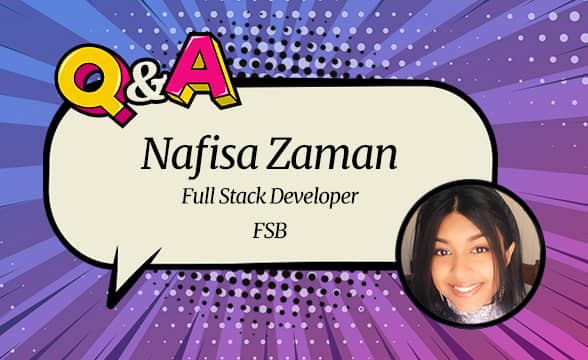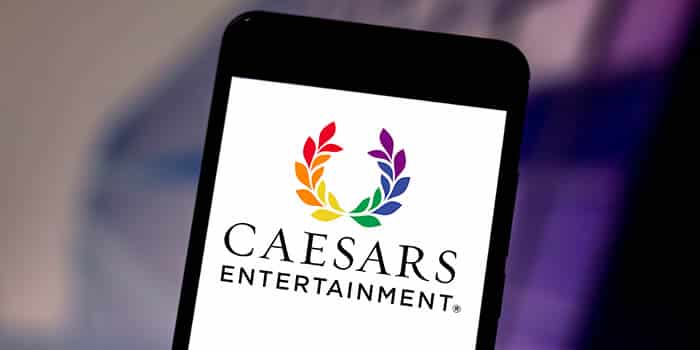- Casino
- By State
- Alabama
- Alaska
- Arizona
- Arkansas
- California
- Colorado
- Connecticut
- Delaware
- Georgia
- Florida
- Hawaii
- Idaho
- Illinois
- Indiana
- Iowa
- Kansas
- Kentucky
- Louisiana
- Maine
- Massachusetts
- Maryland
- Michigan
- Minnesota
- Mississippi
- Missouri
- Montana
- Nebraska
- Nevada
- New Hampshire
- New Jersey
- New Mexico
- New York
- North Carolina
- North Dakota
- Ohio
- Oklahoma
- Oregon
- Pennsylvania
- Rhode Island
- South Carolina
- South Dakota
- Tennessee
- Texas
- Utah
- Vermont
- Virginia
- Washington
- West Virginia
- Wisconsin
- Wyoming
- By State
- Slots
- Poker
- Sports
- Esports
Software Talent Nafisa Zaman on Her Journey with Rubik Academy and FSB

Last year, award-winning gambling technology provider FSB joined forces with Rubik Talent to develop technology skills and promote the careers of graduates from underrepresented groups within the global iGaming industry. Under the agreement, Rubik built a technology graduate program to attract a diverse workforce via the Rubik Academy while FSB pledged its support to Rubik junior technologists with four candidates are chosen from an incredible pool of talent to join its team as part of a two-year training scheme.
One of those talents was Nafisa Zaman, who spent the past 12 months working across various roles within FSB’s leading technology team. Gambling News sat down with Nafisa to learn more about the Rubik Academy and her first 12 months spent immersed in the FSB business. She also talks about some of the challenges she has faced and how she has worked to overcome them as she continues to develop her skill set and understanding of the global iGaming industry.
Q: Can you tell us what role/roles you have been working in at FSB?
I spent the first five months at FSB focused on front-end development and specifically working in the offshore React team. The main project I worked on was building a new website for client JenningsBet, and this was done using React – a JavaScript library for building user interfaces. This was a challenge for me because I only had two weeks of experience working with JavaScript and one week with React. However, with the help of the team, I quickly got up to speed and really enjoyed working on the project. After a couple of months, we were asked to work on other clients including BetGoodwin and Quinnbet. This really did keep me on my toes.
After this, I rotated to work on back-end projects. This also required me to work with Java so I was able to bring the lessons learned in the training academy and the work I did on JenningsBet and the other clients into this role. Key responsibilities included adding markets for various sporting events and creating/implementing new methods to handle logic to process the data we get from our providers into the correct format or adjust existing ones.
Q: What has been the most challenging aspect of the role?
Familiarising myself with the code base was a big challenge, so too was managing the workflow of all the different projects I worked on and the software used for each. Knowing the purpose and dependencies of each project made solving errors a lot easier. But I very much had to learn on the go as I would only become aware of the existence of such projects or the purpose of a project or feature after running into problems relating to them. I constantly learn with every new task that I am given, and I believe that come the end of each day I am more knowledgeable than before and that is the path to becoming a better developer.
Q: What has been the biggest lesson you have learned so far?
Never be scared to ask for help. I learned very early on that everyone at FSB is friendly and approachable and that reaching out for help is encouraged at all times but especially in our scrum stand-up meetings. In my first few days, I was worried about asking a silly question, but I soon realized that asking for help is the best course of action both for my development and also for the projects I was working on.
Q: What has been the most enjoyable aspect of your time at FSB?
I have really enjoyed FSB’s company culture and in particular its monthly engineering club. This is where all of the engineering teams get together in the office for a big presentation on what each is working on. This helps everyone connect and understand the other projects that are in progress, as well as share goals and celebrate achievements.
Q: What achievement are you most proud of to date?
During my time in the front-end development team, we were on a tight deadline to complete the work on the JenningsBet website which was due to go live within two months. This was my first time working on development tickets that were of critical priority or could potentially delay the progression of the project if they were not resolved quickly. This saw my work on a range of tasks including creating pages for betting rules and terms and conditions, the website footer, and other features required for compliance and under time pressure.
Q: Has your perception of the gambling industry changed since you joined FSB?
Absolutely. Rubik and FSB exposed me to the gambling industry for the first time, so I was unsure what to expect. However, I found the industry to be a very aware and responsible one. As employees in such a sector, we are required to complete training courses on information security, safe gambling, remote gambling, and the rules and regulations of the Gambling Commission. This helped me to understand just how seriously the privacy and well-being of customers are taken, as well as ensuring the protection of those that are underage or vulnerable. The repercussions of violating any rules or regulations can be severe, and this made me realize that the gambling industry is a conscientious one.
Q: What are you most looking forward to in your next role at FSB?
After my final rotation, I will spend my second year at FSB working in the team and role that I fit into best during my previous rotations. Due to the nature of our scrum teams, one team consists of front-end, back-end, testers, etc, all working on the same project. My hope is to eventually work in one of these scrum teams as a full stack developer, taking on back-end and front-end tickets, as well as testing if possible. It would be exciting to put my entire skill set to use in such a way.
Q: What would you say to someone considering working in a technical role in the gambling industry?
My advice is to go into a role with an open mind and a will to learn new skills and techniques. Every tech company wants to be innovative and cutting edge, and the technology being used in the gambling industry is no different. For this to happen, it is important to be both flexible and cooperative – a better technique or idea will always come around and require employees to learn a new coding language, software, or technique. For example, at FSB a new software called Vue has been introduced to a couple of the team. Vue is a progressive JavaScript framework and FSB is offering to teach people how to use it, which requires them to move to a different team entirely. Such learning opportunities are exciting and should always be considered as they will enhance you as a developer, as well as enhance the company.
Stoyan holds over 9 years of esports and gambling writing experience under his belt and is specifically knowledgeable about developments within the online scene. He is a great asset to the Gambling News team with his niche expertise and continual focus on providing our readers with articles that have a unique spin which differentiates us from the rest.
Must Read
Insider
May 15, 2025
Joshua Gamble: “Cross-sell is dead. What next?”
More Articles






Casino
July 11, 2025
IGT Reveals Multiple Jackpots Throughout June

Casino
July 11, 2025
Caesars Introduces Digital Wallet in Nevada

Business
July 10, 2025
DoubleDown Acquires Whow Games in €65 Million Deal

Casino
July 10, 2025
Cirsa Shares Hold Steady in Lukewarm Spanish IPO Debut

Casino
July 10, 2025
Mohegan Sun Guest Wins $2M Gambling in Spanish 21












